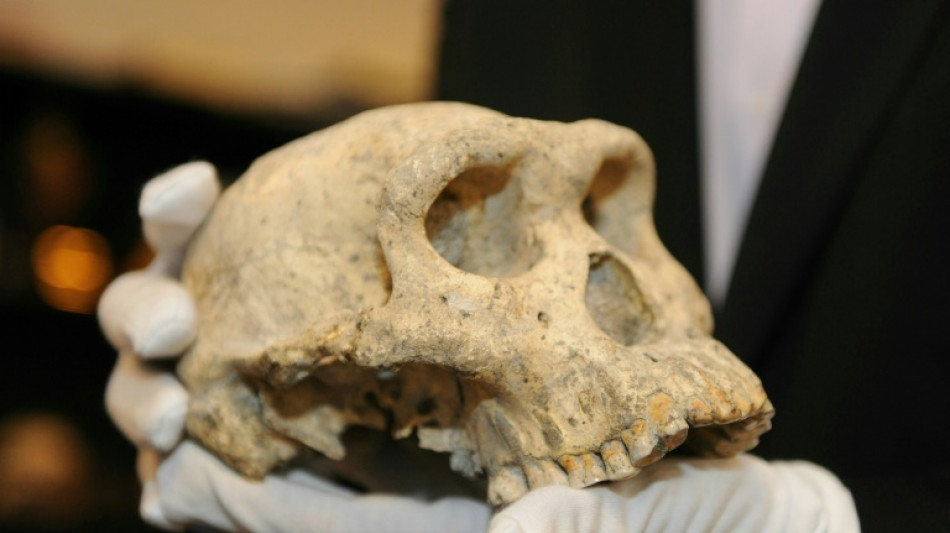
-
 SFWJ / Medcana Announces Strategic Expansion Into Australia With Acquisition of Cannabis Import and Distribution Licenses
SFWJ / Medcana Announces Strategic Expansion Into Australia With Acquisition of Cannabis Import and Distribution Licenses
-
US to withdraw some 1,000 troops from Syria

-
 Four killed after spring storms wreak havoc in the Alps
Four killed after spring storms wreak havoc in the Alps
-
Spurs' Popovich reportedly home and well after 'medical incident'

-
 Trump goes to war with the Fed
Trump goes to war with the Fed
-
Celtics chase second straight NBA title in playoff field led by Thunder, Cavs

-
 White House site blames China for Covid-19 'lab leak'
White House site blames China for Covid-19 'lab leak'
-
Norris edges Piastri as McLaren top Jeddah practice

-
 Trump warns US could ditch Ukraine talks if no progress
Trump warns US could ditch Ukraine talks if no progress
-
Judge denies Sean 'Diddy' Combs push to delay trial

-
 80 killed in deadliest US attack on Yemen, Huthis say
80 killed in deadliest US attack on Yemen, Huthis say
-
Lebanon says two killed in Israeli strikes in south

-
 Trump says US will soon 'take a pass' if no Ukraine deal
Trump says US will soon 'take a pass' if no Ukraine deal
-
F1 success is 'like cooking' - Ferrari head chef Vasseur

-
 Cycling mulls slowing bikes to make road racing safer
Cycling mulls slowing bikes to make road racing safer
-
Macron invites foreign researchers to 'choose France'

-
 Klopp 'happy' in new job despite Real Madrid rumours: agent
Klopp 'happy' in new job despite Real Madrid rumours: agent
-
Alcaraz into Barcelona semis as defending champion Ruud exits

-
 Vance meets Italy's Meloni before Easter at the Vatican
Vance meets Italy's Meloni before Easter at the Vatican
-
Evenepoel returns with victory in Brabantse Pijl

-
 Maresca confident he will survive Chelsea slump
Maresca confident he will survive Chelsea slump
-
Mob beats to death man from persecuted Pakistan minority

-
 Lebanon says one killed in Israeli strike near Sidon
Lebanon says one killed in Israeli strike near Sidon
-
Arsenal's Havertz could return for Champions League final

-
 US officials split on Ukraine truce prospects
US officials split on Ukraine truce prospects
-
Client brain-dead after Paris cryotherapy session goes wrong

-
 Flick demands answers from La Liga for 'joke' schedule
Flick demands answers from La Liga for 'joke' schedule
-
'Maddest game' sums up Man Utd career for Maguire

-
 Trial opens for students, journalists over Istanbul protests
Trial opens for students, journalists over Istanbul protests
-
Gaza rescuers say Israeli strikes kill 24 after Hamas rejects truce proposal

-
 'Really stuck': Ukraine's EU accession drive stumbles
'Really stuck': Ukraine's EU accession drive stumbles
-
'Not the time to discuss future', says Alonso amid Real Madrid links

-
 74 killed in deadliest US attack on Yemen, Huthis say
74 killed in deadliest US attack on Yemen, Huthis say
-
Southgate's ex-assistant Holland fired by Japan's Yokohama

-
 Vance meets Meloni in Rome before Easter at the Vatican
Vance meets Meloni in Rome before Easter at the Vatican
-
Ryan Gosling to star in new 'Star Wars' film

-
 Hamas calls for pressure to end Israel's aid block on Gaza
Hamas calls for pressure to end Israel's aid block on Gaza
-
Russia says Ukraine energy truce over, US mulls peace talks exit

-
 58 killed in deadliest US strike on Yemen, Huthis say
58 killed in deadliest US strike on Yemen, Huthis say
-
Museums rethink how the Holocaust should be shown

-
 Three dead after deadly spring storm wreaks havoc in the Alps
Three dead after deadly spring storm wreaks havoc in the Alps
-
No need for big changes at Liverpool, says Slot

-
 Bloody Philippine passion play sees final performance of veteran 'Jesus'
Bloody Philippine passion play sees final performance of veteran 'Jesus'
-
New US envoy prays, delivers Trump 'peace' message at Western Wall

-
 Postecoglou sticking around 'a little longer' as Spurs show fight in Frankfurt
Postecoglou sticking around 'a little longer' as Spurs show fight in Frankfurt
-
US threatens to withdraw from Ukraine talks if no progress

-
 Tears and defiance in Sumy as Russia batters Ukraine border city
Tears and defiance in Sumy as Russia batters Ukraine border city
-
Russia rains missiles on Ukraine as US mulls ending truce efforts

-
 Tokyo leads gains in most Asian markets on trade deal hopes
Tokyo leads gains in most Asian markets on trade deal hopes
-
Two missing after deadly spring snowstorm wreaks havoc in the Alps


Meet 'Pink', the new face of human evolution in Europe
Western Europe has a new oldest face: the facial bones of an adult nicknamed "Pink" discovered in Spain are from a potential new member of the human family who lived more than 1.1 million years ago, scientists said Wednesday.
Until now, the oldest-known human species in Western Europe was the slender-faced Homo antecessor, dating back around 850,000 years.
But research published in the journal Nature "introduces a new actor in the history of human evolution in Europe", lead study author Rosa Huguet of Spain's University of Rovira i Virgili told a press conference.
The fossilised upper jawbone and partial cheekbone of Pink were discovered at the Atapuerca archaeological site in northern Spain in 2022.
Since then, a team of Spanish scientists have been working to find out more about Pink, whose nickname is a reference to prog rock band Pink Floyd.
The bones were excavated from a layer of silt and red mud 16 metres (52 feet) deep at a site known as Sima del Elefante -- or "elephant pit".
They were found less than 250 metres from where the fossils of Western Europe's previous oldest human, Homo antecessor, were discovered nearly two decades ago.
But the title of oldest human in all of Europe is still held by the Dmanisi people -- also called Homo georgicus -- who lived up to 1.8 million years ago in what is now Georgia.
They were the first members of the human family, or hominins, known to have made it to Europe from Africa, the cradle of humanity.
We modern Homo sapiens first showed up in Africa around 300,000 years ago -- and took our time getting to Europe.
- Face value -
The Spanish researchers used 3D imaging techniques to flesh out Pink's full face.
Homo antecessor had a "very modern" face which is "vertical and flat" similar to our own, said Maria Martinon-Torres, director of Spain's National Research Center on Human Evolution.
But Pink's face is more "projected forward and more robust," the study co-author added.
This means it bears some similarities to the face of Homo erectus -- but not enough that the scientists could confirm that Pink was a member of this important human ancestor.
So the scientists made up a new name for the possible species that Pink could belong to: Homo "affinis" erectus.
"This is the most honest proposal we can make with the evidence we have," Martinon-Torres said.
From just a few face bones, the researchers could not determine Pink's age or gender.
But by analysing small stone tools and animals bones found at the site, they were able to get an idea of the environment Pink lived in.
It was a humid forest landscape, roamed by horses, ancient cattle, monkeys and even some hippos.
The area was a wildlife corridor with plenty of water, making it an "ideal" place for our ancient relatives to settle, Huguet said.
- What happened to them? -
The new discovery supports the hypothesis that early humans settled Europe going from east to west at least 1.4 million years ago, according to the Spanish researchers.
If Pink is a representative of a previously unknown human species, it could have been a bridge between the Dmanisi hominins and Homo antecessors, they added.
But this raises another question: what became of these people?
Spanish paleoanthropologist Jose Maria Bermudez de Castro felt that Pink's people likely did not survive a severe human "bottleneck" nearly 900,000 years ago thought to have been caused by global cooling.
"I think that Homo affinis erectus probably disappeared," the study co-author said.
Future research will aim to shed light on these mysteries. The Spanish team has not yet reached the bottom of the elephant pit -- nor other sites around it.
Y.Kobayashi--AMWN


